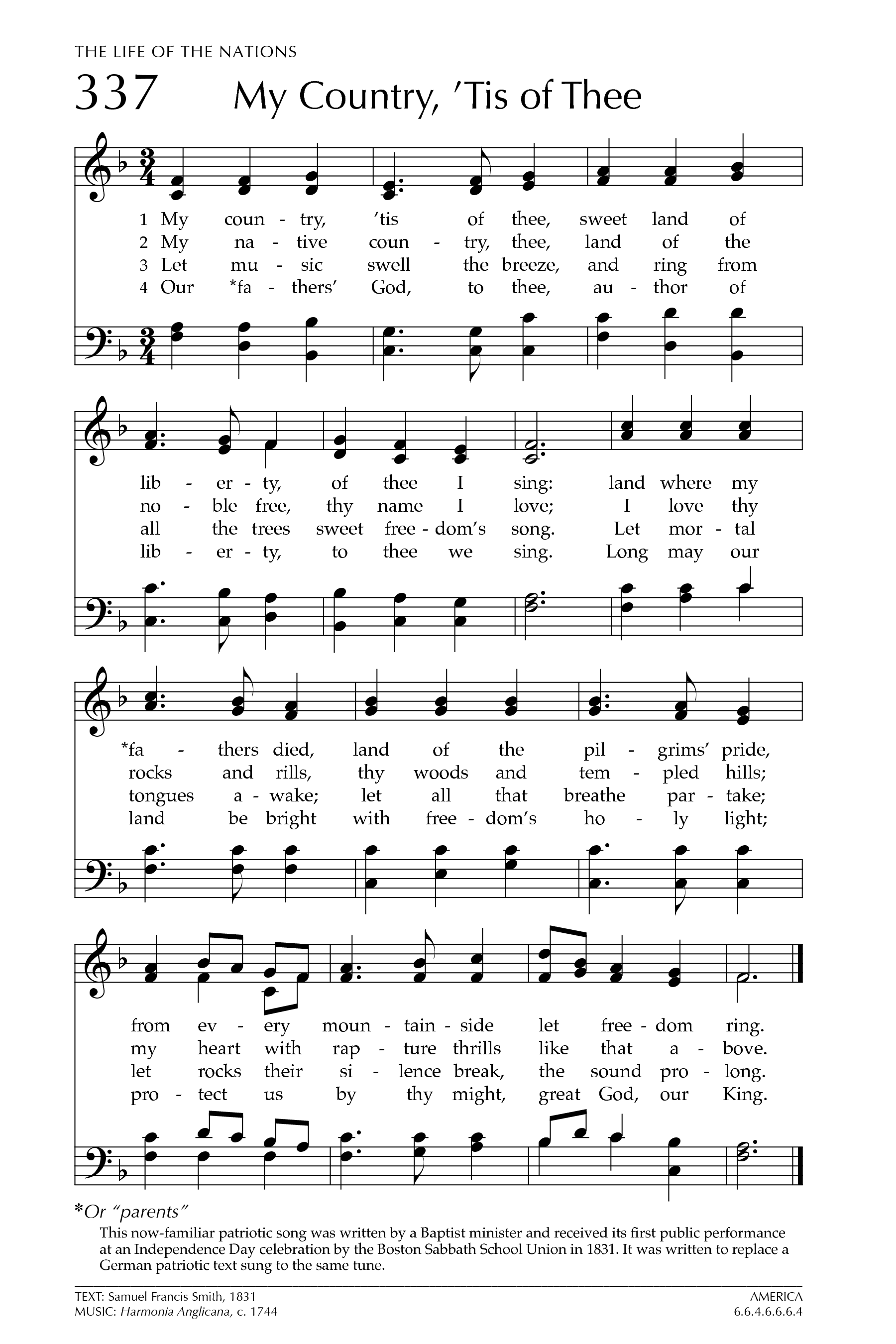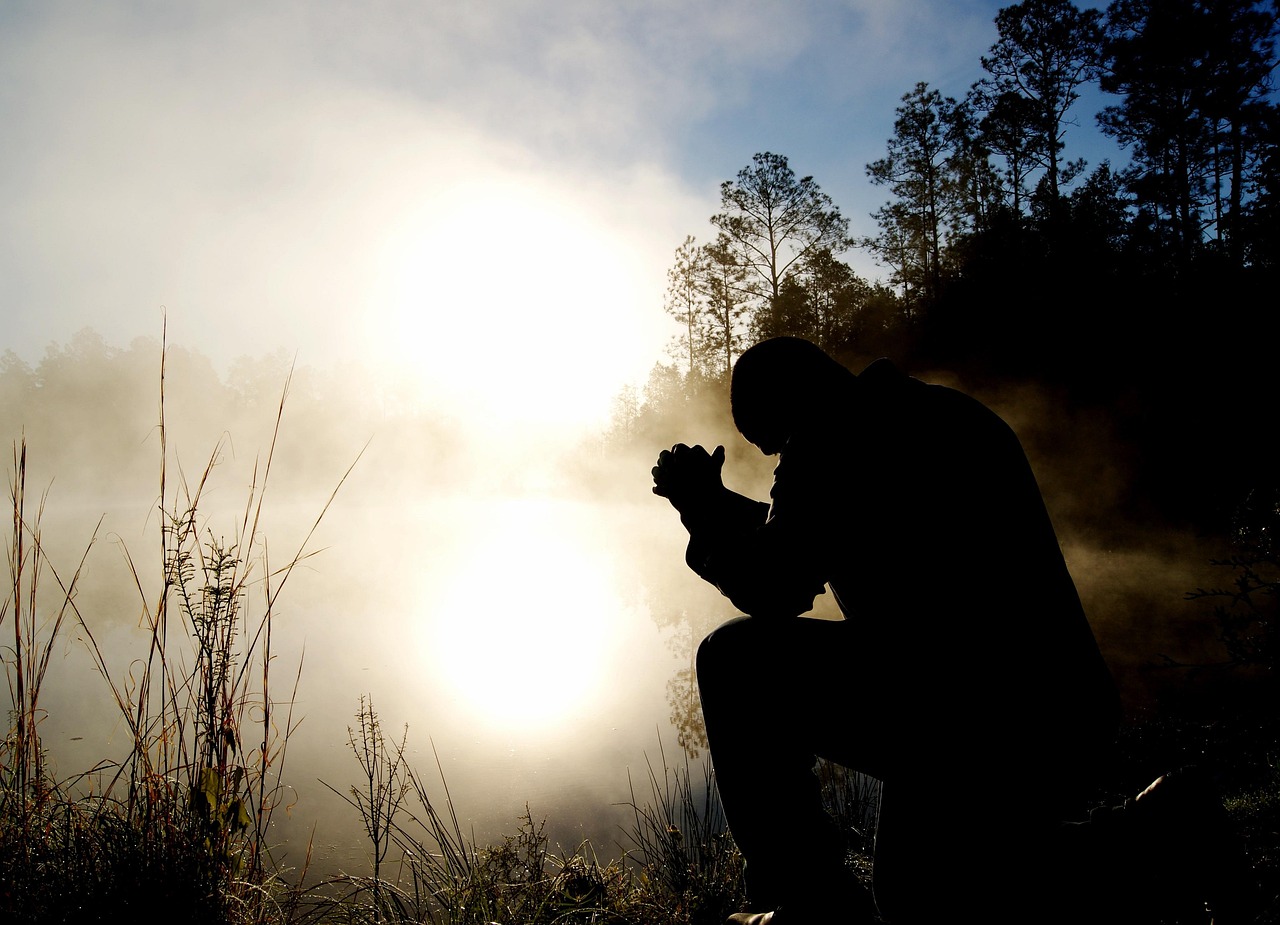My Country, 'Tis of Thee
By Samuel Francis Smith
Lyrics
Sweet land of liberty,
Of thee I sing;
Land where my fathers died,
Land of the pilgrims' pride,
From ev'ry mountainside
Let freedom ring!
Land of the noble free,
Thy name I love;
I love thy rocks and rills,
Thy woods and templed hills;
My heart with rapture thrills,
Like that above.
And ring from all the trees
Sweet freedom's song;
Let mortal tongues awake;
Let all that breathe partake;
Let rocks their silence break,
The sound prolong.
Author of liberty,
To thee we sing;
Long may our land be bright
With freedom's holy light;
Protect us by thy might,
Great God, our King.
Bible Reference
Psalm 33:12
About This Hymn
Samuel Francis Smith (1808-1895), a Baptist minister, theologian, and linguist, penned the beloved patriotic hymn "My Country, 'Tis of Thee" in 1832 while still a young seminary student. The hymn, set to the tune "America" from Thesaurus Musicus (1744) in 6.6.4.6.6.6.4 meter, would become one of America's most enduring patriotic anthems, often called the nation's "unofficial national anthem" before "The Star-Spangled Banner" was officially adopted in 1931. The hymn's text echoes the spirit of Psalm 33:12: "Blessed is the nation whose God is the Lord; and the people whom He hath chosen for His own inheritance."
Born in Boston, Massachusetts, on October 21, 1808, Smith demonstrated intellectual brilliance early in life, graduating from Harvard University in 1829 before pursuing theological studies at Andover Theological Seminary. It was during his time at Andover that he composed his most famous work. A gifted linguist who mastered fifteen languages, Smith would later take up Russian at the remarkable age of 86, just a year before his death. His linguistic talents extended to hymnody, as he wrote or translated 150 hymns throughout his lifetime. Beyond his literary contributions, Smith served as a pastor in several prominent Baptist churches, co-edited the influential 1843 hymnal The Psalmist (which became the standard Baptist hymnal of its era), and later worked as a missionary advocate, even serving as Secretary of the Baptist Missionary Union.
The hymn's creation came about when Lowell Mason, a leading figure in American music education, handed Smith a collection of German songs, including a patriotic piece titled "God Bless Our Native Land." Inspired by the need for a distinctly American patriotic hymn, the 24-year-old Smith scribbled down the lyrics in just thirty minutes on a scrap of paper. The resulting four stanzas (a fifth, containing anti-British sentiment, was later omitted) were set to a melody that, ironically, was already internationally famous—used in Britain as "God Save the King/Queen" and in various forms across Europe, including Switzerland, Germany, and Sweden. The tune's earliest known publication was in 1740, and even Ludwig Beethoven composed piano variations on it in 1841.
First performed on July 4, 1832, by a children's choir from Boston's Park Street Congregational Church, the hymn was an instant success, capturing the young nation's spirit of gratitude and divine reliance. One contemporary admirer praised it as a hymn where "children and philosophers can repeat the words together," noting its power to rise above national crises. Though the melody was shared across nations, Smith's words gave it a uniquely American voice—one that celebrated liberty, natural beauty, and faith in God's providence.
Smith's legacy extends beyond this single hymn. His missionary zeal, scholarly work, and pastoral leadership left a lasting mark on 19th-century American Protestantism. Yet it is "My Country, 'Tis of Thee" that remains his most enduring gift to the nation—a hymn that has been sung at inaugurations, civil rights marches (most notably by Marian Anderson at the Lincoln Memorial in 1939), and countless Fourth of July celebrations. Its closing prayer, "Protect us by Thy might, Great God, our King!" reflects Smith's vision of a nation under divine guidance, a theme that continues to resonate in American civic life.
The hymn's longevity speaks to its rare fusion of theological depth and patriotic fervor, a balance Smith achieved by rooting national identity in reverence for God. While the tune's European origins remind us of shared musical heritage, Smith's lyrics—unchanged since their hurried composition in 1832—stand as a testament to the power of words to shape a young nation's sense of purpose and place in history.


📬 Subscribe to Our Devotional Updates
Receive weekly hymns, devotionals, and website features directly in your inbox.
Hymn Information

- Category: Hymn
- Author/Writer: Samuel Francis Smith (1832)
- Added: July 1, 2025
- Last Updated: July 1, 2025
- Views: 1140
MIDI File
More Hymns by Samuel Francis Smith
Recent Blog Posts
-
 How to Develop a Consistent Prayer Schedule
How to Develop a Consistent Prayer Schedule
Dec 11, 2025 -
 How to Forgive Someone Who Deeply Hurt You
How to Forgive Someone Who Deeply Hurt You
Dec 11, 2025 -

-
 Why Christmas Is Celebrated on December 25
Why Christmas Is Celebrated on December 25
Dec 11, 2025 -
 10 Most Renowned Hymn Writers
10 Most Renowned Hymn Writers
Dec 10, 2025
Visit Us on Social Media
Latest from X (Twitter)
Tweets by HymnalLibraryLatest from Facebook
Latest on YouTube
Daily Bible Verse
Disclaimer
The hymns, sheet music, MIDI files, and related content on this website are provided for educational and research purposes only.
- Public Domain: Many of the hymns featured here are in the public domain and may be freely used.
- Copyrighted Works: Some hymns may still be under copyright protection. Where applicable, permission has either been requested from the copyright owner, or the content is shared under the principles of fair use for educational purposes.
⚠️ Important Notice: If you wish to reproduce, distribute, or use any copyrighted hymn beyond personal study or educational use, you must obtain permission directly from the copyright holder. This website does not grant any rights for commercial use yet.
If there is any other question please address it to us in our Contact Page, for further assistance. Thank you for using the site. May God Bless You.